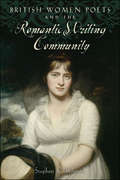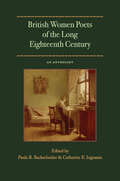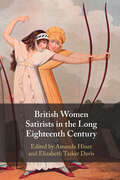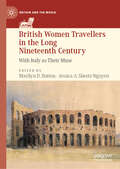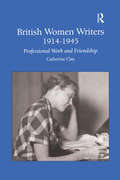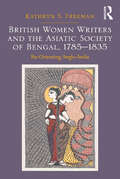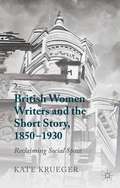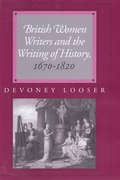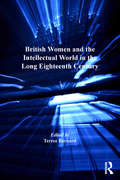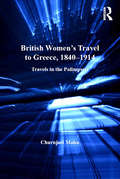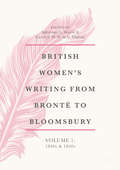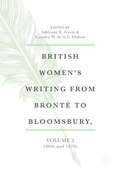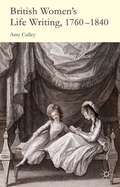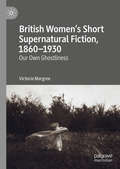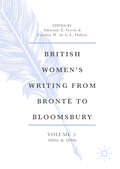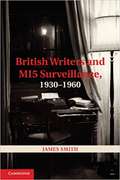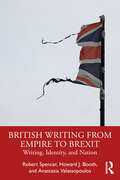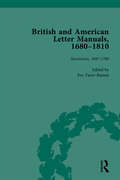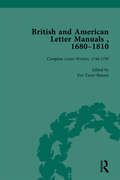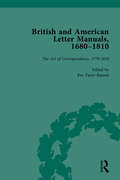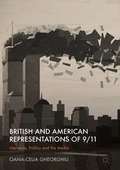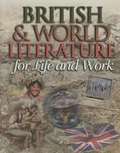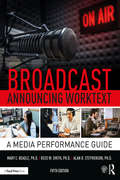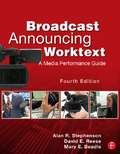- Table View
- List View
British Women Poets and the Romantic Writing Community
by Stephen C. BehrendtApproaching the work of Romantic-era British women poets through the lenses of public radicalism, war, and poetic form.This compelling study recovers the lost lives and poems of British women poets of the Romantic era. Stephen C. Behrendt reveals the range and diversity of their writings, offering new perspectives on the work of dozens of women whose poetry has long been ignored or marginalized in traditional literary history. British Romanticism was once thought of as a cultural movement defined by a small group of male poets. This book grants women poets their proper place in the literary tradition of the time. In an approach ripe for classroom teaching, Behrendt first reviews the subject thematically, exploring the ways in which the poems addressed both public concerns and private experiences. He next examines the use of particular genres, including the sonnet and various other long and short forms. In the concluding chapters, Behrendt explores the impact of national identity, providing the first extensive study of Romantic-era poetry by women from Scotland and Ireland. In recovering the lives and work of these women, Behrendt reveals their active participation within the rich cultural community of writers and readers throughout the British Isles. This study will be a key resource for scholars, teachers, and students in British literary studies, women’s studies, and cultural history.
British Women Poets of the Long Eighteenth Century: An Anthology
by Paula R. Backscheider and Catherine E. IngrassiaThis anthology gathers 368 poems by 80 British women poets of the long eighteenth century. Few of these poems have been reprinted since originally published, and all are crucial to understanding fully the literary history of women writers. Paula R. Backscheider and Catherine E. Ingrassia demonstrate the enormous diversity of poetry produced during this time by organizing the poems in three broad and deliberately overlapping categories: by genre, establishing that women wrote in all of the forms that men did with equal mastery and creativity; by theme, offering a revisionary look at the range of topics these writers addressed, including war, ecology, friendship, religion, and the stages of life; and by the poems’ more specific focus on the women’s experiences as writers.Backscheider and Ingrassia have selected poems that represent the best work of skilled poets, creating a wonderful mix of canonical and little-known pieces. They include the complete texts of longer poems that are abridged or omitted in other collections. Their substantial part introductions, textual notes, bibliographical information, and biographical sketches situate the poets and their writings within the cultural and political milieu in which they appeared. To generate further scholarship on this subject, this essential anthology puts primary texts in front of students, scholars, and general readers. It fills the persistent need to document women’s poetic expression during the long eighteenth century and to rewrite the literary history of the period, a history from which women have largely been excluded.
British Women Satirists in the Long Eighteenth Century
by Amanda Hiner Elizabeth Tasker DavisThis collection of innovative essays by leading scholars on eighteenth-century British women satirists showcases women's contributions to the satiric tradition and challenges the assumption that women were largely targets, rather than practitioners, of satire during the long eighteenth century. The essays examine women's satires across diverse genres, from the fable to the periodical, and attend to women writers' appropriation of a literary style and form often viewed as exclusively masculine. The introduction features a new theory of women's satire and proposes a framework for analyzing satiric techniques employed by women writers. Organized chronologically, the contributors' essays address a wide range of authors and explore the ways in which satiric writings by women engaged in contemporary cultural conversations, influencing assumptions about gender, sociability, politics, and literary practices. This inclusive yet tightly-focused collection formulates an innovative and provocative new feminist theory of satire.
British Women Travellers in the Long Nineteenth Century: With Italy as Their Muse (Britain and the World)
by Jessica A. Sheetz-Nguyen Marilyn D. ButtonDuring the long nineteenth century, British women reframed the masculine paradigm of the Grand Tour. They created a feminist travel gaze, intentionally or unintentionally, that differed from that of male peers. Unlike their brothers, who went for personal edification, women with means left their English homes for the great Italian cities of Florence, Naples, and Rome to escape personal disappointments and the social limitations imposed by parents, spouses, and society. The anonymity of travel to a distant land and new freedoms fostered political and creative achievements, including entrepreneurial journalism, literary masterpieces, and social advocacy for their gender, which redefined the contours of the Anglo-Italian cultural landscape. The historical evidence presented here testifies to the life-changing capacity of travel and firmly demonstrates how British women’s history and literature enriches and broadens narratives about Britain and the World.
British Women Writers 1914-1945: Professional Work and Friendship
by Catherine ClayCatherine Clay's persuasively argued and rigorously documented study examines women's friendships during the period between the two world wars. Building on extensive new archival research, the book's organizing principle is a series of literary-historical case-studies that explore the practices, meanings and effects of friendship within a network of British women writers, who were all loosely connected to the feminist weekly periodical Time and Tide. Clay considers the letters and diaries, as well as fiction, poetry, autobiographies and journalistic writings, of authors such as Vera Brittain, Winifred Holtby, Storm Jameson, Naomi Mitchison, and Stella Benson, to examine women's friendships in relation to two key contexts: the rise of the professional woman writer under the shadow of literary modernism and historic shifts in the cultural recognition of lesbianism crystallized by The Well of Loneliness trial in 1928. While Clay's study presents substantial evidence to support the crucial role close and enduring friendships played in women's professional achievements, it also boldly addresses the limitations and denials of these relationships. Producing 'biographies of friendship' untold in existing author studies, her book also challenges dominant accounts of women's friendships and advances new ways for thinking about women's friendship in contemporary debates.
British Women Writers and the Asiatic Society of Bengal, 1785-1835: Re-Orienting Anglo-India
by Kathryn S. FreemanIn her study of newly recovered works by British women, Kathryn Freeman traces the literary relationship between women writers and the Asiatic Society of Bengal, otherwise known as the Orientalists. Distinct from their male counterparts of the Romantic period, who tended to mirror the Orientalist distortions of India, women writers like Phebe Gibbes, Elizabeth Hamilton, Sydney Owenson, Mariana Starke, Eliza Fay, Anna Jones, and Maria Jane Jewsbury interrogated these distortions from the foundation of gender. Freeman takes a three-pronged approach, arguing first that in spite of their marked differences, female authors shared a common resistance to the Orientalists’ intellectual genealogy that allowed them to represent Vedic non-dualism as an alternative subjectivity to the masculine model of European materialist philosophy. She also examines the relationship between gender and epistemology, showing that women’s texts not only shift authority to a feminized subjectivity, but also challenge the recurring Orientalist denigration of Hindu masculinity as effeminate. Finally, Freeman contrasts the shared concern about miscegenation between Orientalists and women writers, contending that the first group betrays anxiety about intermarriage between East Indian Company men and indigenous women while the varying portrayals of intermarriage by women show them poised to dissolve the racial and social boundaries. Her study invites us to rethink the Romantic paradigm of canonical writers as replicators of Orientalists’ cultural imperialism in favor of a more complicated stance that accommodates the differences between male and female authors with respect to India.
British Women Writers and the Short Story, 1850-1930
by Kate KruegerThis book addresses a critically neglected genre used by women writers from Gaskell to Woolf to complicate Victorian and modernist notions of gender and social space. Their innovative short stories ask Britons to reconsider where women could live, how they could be identified, and whether they could be contained.
British Women Writers and the Writing of History, 1670-1820
by Devoney LooserChosen by Choice Magazine as an Outstanding Academic TitleUntil recently, history writing has been understood as a male enclave from which women were restricted, particularly prior to the nineteenth century. The first book to look at British women writers and their contributions to historiography during the long eighteenth century, British Women Writers and the Writing of History, 1670-1820, asks why, rather than writing history that included their own sex, some women of this period chose to write the same kind of history as men—one that marginalized or excluded women altogether. But as Devoney Looser demonstrates, although British women's historically informed writings were not necessarily feminist or even female-focused, they were intimately involved in debates over and conversations about the genre of history.Looser investigates the careers of Lucy Hutchinson, Lady Mary Wortley Montagu, Charlotte Lennox, Catharine Macaulay, Hester Lynch Piozzi, and Jane Austen and shows how each of their contributions to historical discourse differed greatly as a result of political, historical, religious, class, and generic affiliations. Adding their contributions to accounts of early modern writing refutes the assumption that historiography was an exclusive men's club and that fiction was the only prose genre open to women.
British Women and the Intellectual World in the Long Eighteenth Century (British Literature in Context in the Long Eighteenth Century)
by Teresa BarnardHighlighting the remarkable women who found ways around the constraints placed on their intellectual growth, this collection of essays shows how their persistence opened up attributes of potent female imagination, radical endeavour, literary vigour, and self-education that compares well with male intellectual achievement in the long eighteenth century. Disseminating their knowledge through literary and documentary prose with unapologetic self-confidence, women such as Anna Barbauld, Anna Seward, Elizabeth Inchbald and Joanna Baillie usurped subjects perceived as masculine to contribute to scientific, political, philosophical and theological debate and progress. This multifaceted exploration goes beyond traditional readings of women’s creativity to add fresh, at times controversial, insights into the female view of the intellectual world. Bringing together leading experts on British women’s lives, work and writings, the volume seeks to rediscover women’s appropriations of masculine disciplines and to examine their interventions into the intellectual world. Through their engagement with a unique perspective on women’s lives and achievements, the essays make important contributions to the existing body of knowledge in this important area that will inform future scholarship.
British Women's Travel to Greece, 1840-1914: Travels in the Palimpsest (The\nineteenth Century Ser.)
by Churnjeet MahnBeginning with the publication of the first Murray guidebook to Greece in 1840 and ending with Virginia Woolf's journey to Athens, this book offers a genealogy of British women's travel literature about Greece. Churnjeet Mahn recounts the women's first-hand experiences of the sites and sights of antiquity, analyzing travel accounts by archaeologists, ethnographers, journalists, and tourists to chart women's renderings of Modern Greece through a series of discursive lenses. Mahn's offers insights into the importance of the Murray and Baedeker guidebooks; how knowledge of Greece and Classical Studies were used to justify colonial rule of India at the same time that Agnes Smith Lewis and Jane Ellen Harrison used Greece as a symbol of women's emancipation; British women's production of the first anthropological accounts of Modern Greece; and fin-de-siècle women who asserted their right to see and claim antiquity at the same time that the safety of the independent lady traveler was being called into question by the media.
British Women's Writing from Brontë to Bloomsbury, Volume 1: 1840s and 1850s (British Women’s Writing from Brontë to Bloomsbury, 1840-1940 #1)
by Adrienne E. Gavin Carolyn W. de la L. OultonThis five-volume series, British Women’s Writing From Brontë to Bloomsbury, 1840-1940, historically contextualizes and traces developments in women’s fiction from 1840 to 1940. Critically assessing both canonical and lesser-known British women’s writing decade by decade, it redefines the landscape of women’s authorship across a century of dynamic social and cultural change. With each of its volumes devoted to two decades, the series is wide in scope but historically sharply defined. Volume 1: 1840s and 1850s inaugurates the series by historically and culturally contextualizing Victorian women’s writing distinctly within the 1840s and 1850s. Using a range of critical perspectives including political and literary history, feminist approaches, disability studies, and the history of reading, the volume’s 16 original essays consider such developments as the construction of a post-Romantic tradition, the politicization of the domestic sphere, and the development of crime and sensation writing. Centrally, it reassesses key mid-nineteenth-century female authors in the context in which they first published while also recovering neglected women writers who helped to shape the literary landscape of the 1840s and 1850s.
British Women's Writing from Brontë to Bloomsbury, Volume 2: 1860s and 1870s (British Women’s Writing from Brontë to Bloomsbury, 1840-1940 #2)
by Adrienne E. Gavin Carolyn W. de la L. OultonThis five-volume series, British Women’s Writing From Brontë to Bloomsbury, 1840–1940, historicallycontextualizes and traces developments in women’s fiction from 1840 to 1940. Critically assessingboth canonical and lesser-known British women’s writing decade by decade, it redefines the landscapeof women’s authorship across a century of dynamic social and cultural change. With each ofits volumes devoted to two decades, the series is wide in scope but historically sharply defined.Volume 2: 1860s and 1870s continues the series by historically and culturally contextualizing Victorianwomen’s writing distinctly within the 1860s and 1870s. Covering a range of fictional approaches,including short stories, religiously inflected novels, and comic writing the volume’s 16 original essaysconsider such developments as the sensation craze, the impact of new technologies, and the careeropportunities opening for women. Centrally, it reassesses key nineteenth-century female authors inthe context in which they first published while also recovering neglected women writers who helpedto shape the literary landscape of the 1860s and 1870s.
British Women’s Life Writing, 1760–1840
by Amy CulleyBritish Women's Life Writing, 1760-1840 brings together for the first time a wide range of print and manuscript sources to demonstrate women's innovative approach to self-representation. It examines canonical writers, such as Mary Wollstonecraft, Mary Robinson, and Helen Maria Williams, amongst others.
British Women’s Short Supernatural Fiction, 1860–1930: Our Own Ghostliness
by Victoria MargreeThis book explores women’s short supernatural fiction between the emergence of first wave feminism and the post-suffrage period, arguing that while literary ghosts enabled an interrogation of women’s changing circumstances, ghosts could have both subversive and conservative implications. Haunted house narratives by Charlotte Riddell and Margaret Oliphant become troubled by uncanny reminders of the origins of middle-class wealth in domestic and foreign exploitation. Corpse-like revenants are deployed in Female Gothic tales by Mary Elizabeth Braddon and Edith Nesbit to interrogate masculine aestheticisation of female death. In the culturally-hybrid supernaturalism of Alice Perrin, the ‘Marriage Question’ migrates to colonial India, and psychoanalytically-informed stories by May Sinclair, Eleanor Scott and Violet Hunt explore just how far gender relations have really progressed in the post-First World War period. Study of the woman’s short story productively problematises literary histories about the “golden age” of the ghost story, and about the transition from Victorianism to modernism.
British Women’s Writing from Brontë to Bloomsbury, Volume 3: 1880s and 1890s (British Women's Writing from Brontë to Bloomsbury, 1840–1940 #3)
by Adrienne E. Gavin Carolyn W. de la L. OultonThis five-volume series, British Women’s Writing From Brontë to Bloomsbury, 1840–1940, historically contextualizes and traces developments in women’s fiction from 1840 to 1940. Critically assessing both canonical and lesser-known British women’s writing decade by decade, it redefines the landscape of women’s authorship across a century of dynamic social and cultural change. With each of its volumes devoted to two decades, the series is wide in scope but historically sharply defined. Volume 3: 1880s and 1890s analyses confluences and developments in women’s writing across two fin-de-siècle decades. Its 16 original essays reconsider fiction by canonical and lesser-known women writers, redefining the landscape of female authorship during these decades. By exploring women’s fiction within the social and cultural contexts of the 1880s and 1890s, the collection distils in terms of women’s writing how these decades discretely build on earlier work that is identifiably Victorian. The last two decades of the century, in distinctive ways, witnessed literary experiment, reflection on the limits of realism, and a fruitful sense of confusion about what was ending and what was about to begin.
British Writers and MI5 Surveillance, 1930-1960
by James SmithBritain's domestic intelligence agencies maintained secret records on many left-wing writers after the First World War. Drawing on recently declassified material from 1930 to 1960, this revealing study examines how leading figures in Britain's literary scene fell under MI5 and Special Branch surveillance, and the surprising extent to which writers became willing participants in the world of covert intelligence and propaganda. Chapters devoted to W. H. Auden and his associates, theatre pioneers Ewan MacColl and Joan Littlewood, George Orwell, and others describe methods used by MI5 to gather information through and about the cultural world. The book also investigates how these covert agencies assessed the political influence of such writers, providing scholars and students of twentieth-century British literature an unprecedented account of clandestine operations in popular culture.
British Writers and the Approach of World War II
by Steve EllisThis book considers the literary construction of what E. M. Forster calls 'the 1939 State', namely the anticipation of the Second World War between the Munich crisis of 1938 and the end of the Phoney War in the spring of 1940. Steve Ellis investigates not only myriad responses to the imminent war but also various peace aims and plans for post-war reconstruction outlined by such writers as T. S. Eliot, H. G. Wells, J. B. Priestley, George Orwell, E. M. Forster and Leonard and Virginia Woolf. He argues that the work of these writers is illuminated by the anxious tenor of this period. The result is a novel study of the 'long 1939', which transforms readers' understanding of the literary history of the eve-of-war era.
British Writing from Empire to Brexit: Writing, Identity, and Nation
by Robert Spencer Howard J. Booth Anastasia ValassopoulosThis introduction to British literature from 1900 to 2021 looks at British writing from the perspective of the 2016 Brexit vote and its seismic repercussions. The book covers a wide variety of British literature in order to expose the cultural and political history of Britain, its repeated challenges and highly class-bound, patriarchal structure.British Writing from Empire to Brexit: Writing, Identity, and Nation offers a stark view of what British culture has come to represent, and the repercussions. Not shying away from discussions around imperialism, nationalism, and racism, Robert Spencer, Howard J. Booth, and Anastasia Valassopoulos offer a radical deconstruction of what Britishness can, and should, mean, promoting a convincing and accessible way to rethink the texts and field. The authors analyse novels, poetry, and prose which amplify the dissentient and dissident perspectives of women, gender non-conforming, and queer authors, as well as the varied viewpoints and insights of working-class, immigrant, postcolonial, Black, and Asian writers, showing how these works open up post-national futures after empire and after Brexit.Ultimately offering a model to rescue Britain from its current crises and anxieties, this book is an essential read for anyone approaching the study of British literature and culture, as well as those working on postcolonial studies, decolonisation, recent British history and politics, or with an interest in empire and Brexit.
British and American Letter Manuals, 1680-1810, Volume 2
by Eve Tavor BannetDuring the 18th century, letter manuals became the most popular form of conduct literature. They were marketed to and used by a wide spectrum of society, from maidservants and apprentices, through military officers and merchants, to gentlemen, parents and children. This work presents the most influential manuals from both sides of the Atlantic.
British and American Letter Manuals, 1680-1810, Volume 3
by Eve Tavor BannetDuring the 18th century, letter manuals became the most popular form of conduct literature. They were marketed to and used by a wide spectrum of society, from maidservants and apprentices, through military officers and merchants, to gentlemen, parents and children. This work presents the most influential manuals from both sides of the Atlantic.
British and American Letter Manuals, 1680-1810, Volume 4
by Eve Tavor BannetDuring the 18th century, letter manuals became the most popular form of conduct literature. They were marketed to and used by a wide spectrum of society, from maidservants and apprentices, through military officers and merchants, to gentlemen, parents and children. This work presents the most influential manuals from both sides of the Atlantic.
British and American Representations of 9/11: Literature, Politics and the Media
by Oana-Celia GheorghiuThis book argues that twenty-first-century neorealist fiction is inspired by political and journalistic discourses and, along with them, constitutes one of the many representations of the attacks on September 11 and their outcomes. Adopting a neorealist stance, this book is placed at the intersection of realism and fiction, with often reference to what is perceived as objective writing (media and political texts), not at all so divorced from the practice of literary writings on the event that shook the world on September 11, 2001.
British and World Literature for Life and Work
by Christine Bideganeta Larocco Elaine Bowe JohnsonThe four-volume Literature for Life and Work series continues with British and World Literature for Life and Work(Grade 12). This book challenges students to think critically, work together in teams, and reflect on universal themes by using selections from British and world literature.
Broadcast Announcing Worktext: A Media Performance Guide
by Alan R. Stephenson Reed Smith Mary E. BeadleBroadcast Announcing Worktext, now in its fifth edition, remains one of the best resources for those looking to gain the skills, techniques, and procedures necessary to enter the competitive field of broadcast performance. Written accessibly, with easy-to-digest modules and practice projects, this book encourages active participation from readers to help develop their talent on air. In addition to the principles of good performance, the book addresses the importance of the audience and how to communicate effectively to diverse groups. The book combines traditional teaching with practical experience, and includes sample scripts and self-study exercises to allow for a practical, hands-on application of key concepts. The fifth edition, expanded throughout, features updates about performance on the Internet and social media, as well as content about podcasting and audio performance. A new chapter on international media offers readers a look at media performance and career possibilities around the world. This book is an invaluable resource for any student of journalism, communication, or public relations looking to enhance their media performance skills. A detailed accompanying website features audio-clips, sample test questions, and a Professionals’ Comment Bank setting out experience and advice from working pros.
Broadcast Announcing Worktext: A Media Performance Guide
by David Reese Mary Beadle Alan StephensonThe Broadcast Announcing Worktext provides you with the skills, techniques, and procedures necessary to enter this highly competitive field of broadcast performance. In addition to the principles of good performance, this book addresses the importance of audience and how to communicate effectively to various groups. Television and radio studio environments, announcer specializations and responsibilities, and developing a broadcast delivery style are just a few of the many topics covered. Factual information is presented in brief, easy-to-digest modules and is enhanced with self-study questions and projects. The self-study provides an immediate check on what you learn, and the projects allow for a practical hands-on application of key concepts in the material. The worktext format, with many real-life examples, combines both traditional teaching and practical experience. A companion CD illustrates techniques and concepts in each chapter with audio and visual examples. This third edition will give you knowledge of other non-traditional forms of announcing, such as online radio announcing, podcast announcing, and other forms of online announcing, such as online shows, clips, and news.
